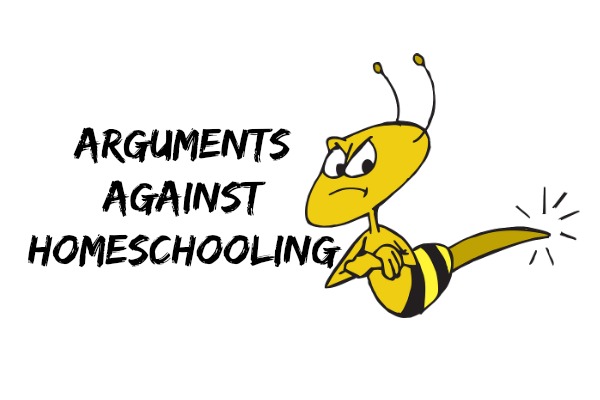 Homeschooling is a controversial topic for many people. Some families cannot comprehend why anyone would homeschool and many think that homeschooling is harmful. I recently ran across an article on a Beatrix Potter books website (site no longer works) that tore into homeschooling. I would like to address some of her arguments.
Homeschooling is a controversial topic for many people. Some families cannot comprehend why anyone would homeschool and many think that homeschooling is harmful. I recently ran across an article on a Beatrix Potter books website (site no longer works) that tore into homeschooling. I would like to address some of her arguments.
My next question is, how do you expect to protect your child from all the dangers of society? Home schooling your child is a parents attempt to isolate their child from the real world scary stories. If you are afraid of your child being bullied, what will happen when your child becomes an adult and meets a bullying boss?
I have heard this argument many times. Since when is exposing a child to abusive peers beneficial? We have no tolerance for abusive parents, but abusive peers will teach us how to deal with a future boss? No, bullying does not teach us how to deal with bullying. Is it really okay to put an immature child in an abusive situation so they will know how to handle a bullying situation as a mature adult? Here is what Amber MacDonald says in her School Bullying: A Review of the Research (link no longer works):
Additionally, some individuals actually believe that children bullied are subsequently toughened up and, as such, better prepared for the harsh realities of adulthood. Not only are these types of beliefs ill conceived, but “longitudinal research indicates that childhood bullying is associated with adult antisocial behaviour, such as criminality, and limits opportunities to attain socially desired objectives” (Farrington, 1993 in Craig et al., 1998, p. 7)
If you think about it, a child repeatedly exposed to abusive behavior may begin to think abusive behavior is normal.
Another argument from the Beatrix Potter website addressed parental qualifications.
Parents claim to home school their children to provide them with a better education then public schooling can give. My question is, How is a parent qualified to provide their child with an education?
Brian Ray’s article Research Facts on Homeschooling from the National Home Research Institute shows:
- Children who are homeschooled normally score 15-30 percentile points higher than their public school peers.
- Children who are homeschooled score above average on achievement tests without regard for a parent’s education or income.
- A parent’s qualifications as a certified teacher is not associated with higher academic skills.
- Homeschooled students typically score above average on the ACT and SAT.
- Colleges are actively recruiting homeschooled students.
I guess a better question is how is a teacher better qualified to teach my child? They may have studied on theories of education, but they don’t know my child. They may know how to conduct a lesson and keep a group of children tuned to instruction, but they don’t see the whole picture. They have to use a set curriculum and try to engage all learning styles. A parent can choose a curriculum based on a child’s learning style or interests and is free to change if something is not working. Individualized instruction always trumps general classroom instruction in my book. We trust parents to be the teacher for the most important learning years of a child’s life. Yet when a child reaches a certain age parents are no longer qualified to teach?
Her argument continues :
Therefore if a parent did not even get a high school diploma in New York they are still qualified to teach their child high school material. I have concluded from this information that a child can only go as far as their parents have, and in some instances that may not be very far. Therefore these children are being cheated out of a valuable education.
Homeschooling is not about a parent sitting down and teaching everything the parent knows. Do adults only learn when they are taught by a teacher in a classroom? Learning how to learn is an important skill. Children can surpass their parent’s knowledge because they see the world as their classroom.
I recently watched my son play a game on Wii. He had set up a username of Triton. I was wondering how he heard of Triton because he hasn’t seen The Little Mermaid or studied Greek mythology yet. It turns out that it is his favorite moon. I didn’t teach him that. My husband didn’t teach him that. I didn’t even know that Neptune had a moon. He was interested in the subject and learned on his own.
The argument continues:
Also I have questioned, having a parent as a teacher… are they teaching their children their bias’s? In an institution goals are made to make sure that the material being taught is bias free. However in a home, a parent is free to choose, and some knowingly, others unknowingly are teaching their child their own biases. In a world that is culturally diverse, one must be exposed to different people and situations in order to appreciate our differences.
I do find this quote a little difficult to comprehend. Bias is present everywhere. Bias is present in public schools. You can’t find bias-free instruction. You can’t find a bias-free parent. Public schools are not culturally diverse. In a public school you have the people in your neighborhood and your same age grouped together. The world goes far beyond your own neighborhood. Even if your neighborhood school had a wide variety of cultures how much exposure are you getting in a structured school environment? The real world is full of different cultures waiting to be discovered.
She questions:
My valuable question that ties all these subjects together is how will a child develop his or her socialization skills if they are not exposed to different people? The school environment is much like one’s work environment. If a child has never been exposed to such an environment how will they know how to adapt? How will they react to all the different people, different opinions, and different viewpoints?
Research shows that homeschooled children have better socialization skills. The school environment is not like any work environment I have been in. Work environments have people of all ages and backgrounds who are interested in a common goal. These people were interviewed and hired based on their interest and qualifications. School environments consist of people from a certain neighborhood who are grouped by age. They are not there by choice and interest in academic achievement is often ridiculed by those same peers.
Different people and different viewpoints can be found in a classroom. But differences are not something that are welcomed with open arms in a classroom environment. In a classroom, differences are often the target of bullying. Kids who are different in some way are pressured into acting or looking like everyone else.
The real world outside the classroom is full of opinions, people, and viewpoints. Children growing up outside this “necessary socialization training” found in classrooms may be much more comfortable being themselves and more accepting of the differences of others. I believe that growing up outside this peer-pressured environment that cultivates sameness will actually help a child develop greater socialization skills, because, to them, differences are normal and not something to be fixed.
Also, the real world isn’t limited to people your own age or people from your neighborhood. A classroom environment can actually limit the different kinds of people a child knows.
Her argument concludes:
These children will not have the experience that public school provides, they will not have the experience that unites us citizens and provides us with a common background. They will not get to experience the simple things like go to prom’s, participate in sports in which an entire school is benefited, have a school lunch, a lock on their locker, a ride on a school bus, recess, watching for their school to be cancelled on TV from snow days, and all the other little but character building events that take place in a public school students life.
Interesting, but the idea that children are missing out by being with their parent all day is ludicrous. Many homeschooled children do go to proms, participate in sports, and have fun park times. Conversely, what are public school students missing? They miss simple things like wearing your pajamas all day, having a freshly prepared hot lunch, doing math from the comfort of your own couch, sleeping in instead of getting up early to catch a bus, running to the bathroom whenever you need to go, laughing with a sibling during the day, lots of free time to explore interests, skipping school on a sunny day, etc.
So why do we homeschool? I homeschool to give my children a better and more individualized education. I want them to learn at their level and avoid boredom or feelings of inadequacy for being ahead or below the curve. I love spending time with my children and enjoy teaching them. I want to impart to them a love for learning and a knowledge of the world. I want them to know Jesus and understand their role as a Christian. The list can go on.
I’ve worked in public schools as a professional. I’ve observed in classrooms and worked with many students. I know my children are not missing anything beneficial.







I want my child home schooled but I work and not working is not an option. Are there homes that take in other children for a group home schooling experience?
Beatrix Potter was taught at home by a governess…
“I recently ran across an article on a Beatrix Potter books website (site no longer works) that tore into homeschooling. I would like to address some of her arguments.” I find it ironic that this article tearing into homeschooling was on a Beatrix Potter website, as Beatrix herself was home educated.
Thank you for writing this article! As a former public schooled student and having pulled my children out of public school, I totally agree with all of your rebuttals. The writer of that article speaks of the bias of parents, yet her words ooze with bias. “Those who can, teach. Those who can’t make laws about teaching.”
When I was younger, I used those same arguments against homeschooling. It took becoming a public school teacher, becoming a mother, years of research, and talking with homeschooling parents to realize how wrong I was. Articles like these that articulately respond to the criticisms of homeschooling and point to actual research backing their stance are crucial for people who have not yet made this journey. Kudos for a thoughtful and reasoned response, and thank you.
Your responses are so well articulated! I heard at a workshop recently that one parent dedicated to their child for a lifetime (the homeschooling mom) is a million times more effective than all the teachers in the world! I am a former public school teacher, too. ;-). Thanks for this post.
well said. 🙂
Thanks for taking the time to answer this argument. I’d love to take the time to write out my own answers!
In a sense, the author’s statement “These children will not have the experience that public school provides, they will not have the experience that unites us citizens and provides us with a common background.” is correct. Those of us lucky enough to not be put through 12-13 years of the conveyor belt education are not blind followers, cut from the same cookie cutter as many other people in our society today. Let’s continue to teach children how to think and how to learn – they’ll be the future leaders (perhaps future revolutionaries) of our country.
Oh, and by the way, wasn’t Beatrix Potter homeschooled or at least tutored? This is one of my favorite quotes:
“Thank goodness I was never sent to school; it would have rubbed off some of the originality.”
Debbie
http://www.stayathomemyheart.wordpress.com
Amen. I couldn’t agree more.
I especially appreciate that you point out how public school is NOT like real life. That issue, in particular, gets under my skin, and has since I was in sixth grade. How are people so blinded to that obvious fact? I don’t get it.
Thanks for addressing these issues!
Thank you for this wonderfully written response. I wasn’t quite sure if the author of the other article was serious or was just poking fun. I couldn’t respond to the article because it was so crazy.
This is a very well-reasoned response, thank you.
I know many who trained as educators and every single one of them tells me that they have had to unlearn everything they learned in school in order to teach their children.
They further state that there is a huge disconnect between the teaching colleges and what actually occurs within the teaching community when you get there.